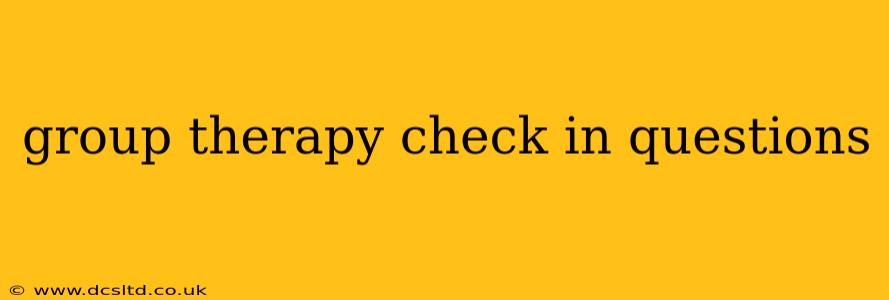Group therapy offers a unique space for individuals to share their experiences, learn from others, and build supportive connections. Effective check-in questions are crucial for fostering a safe and productive group environment. These questions should be tailored to the specific group's needs and goals, but the following examples offer a range of options to consider. This guide will explore various types of check-in questions, discuss their purpose, and provide tips for effective implementation.
What are Some Good Check-In Questions for Group Therapy?
The best check-in questions are concise, open-ended, and encourage meaningful self-reflection. They should also be adaptable to the group’s current focus and the individual's comfort level. Here are several categories and examples:
Emotional Check-Ins:
- "How are you feeling today?" This simple question opens the door for members to explore their current emotional state. It can be further refined by adding: "on a scale of 1 to 10, with 1 being the lowest and 10 being the highest?"
- "What's one word that describes your emotional state right now?" This helps to identify a prevailing feeling quickly and efficiently.
- "What's been your biggest emotional challenge this week?" This delves deeper, allowing individuals to discuss specific difficulties they've faced.
- "Is there a specific emotion you're working on managing this week?" This question is helpful for individuals with identified emotional regulation challenges.
Behavioral Check-Ins:
- "What's something you did this week that you're proud of?" Focusing on accomplishments promotes self-esteem and positive self-perception.
- "What's one thing you're grateful for this week?" Encourages a focus on positivity and appreciation.
- "What's one area where you feel you've made progress this week?" Helps participants identify and track their growth.
- "Was there a specific situation or interaction this week that you found challenging?" Allows the group to explore difficulties and develop coping strategies.
Cognitive Check-Ins:
- "What are you thinking about the most these days?" Explores dominant thoughts and potential cognitive distortions.
- "What's one positive affirmation you're repeating to yourself this week?" Promotes positive self-talk and mental health.
- "What's one cognitive strategy you used this week to manage a difficult situation?" Allows sharing of coping skills and strategies.
- "What's your biggest challenge in terms of your thought patterns?" Provides insight into areas needing further attention.
Spiritual/Existential Check-Ins (Optional, depending on group focus):
- "What brings you a sense of peace or purpose this week?" Explores aspects of well-being that extend beyond the purely emotional or cognitive.
- "What's something you are learning about yourself?" Encourages self-discovery and personal growth.
- "What's your biggest hope or intention for yourself this week?" Focuses on future goals and aspirations.
How to Choose the Right Check-In Questions for Your Group?
The appropriateness of check-in questions depends on several factors:
- Group Goals: If the group focuses on anxiety management, questions related to coping mechanisms and anxiety levels will be more suitable. If the focus is on relationship dynamics, questions might explore interactions and communication patterns.
- Group Dynamics: The group's level of comfort and trust influences the depth and type of questions. Start with simpler questions in newer groups and gradually progress to more complex ones.
- Individual Needs: Facilitators should be sensitive to the individual needs and limitations of group members. Some members may need more time to respond, while others may be more comfortable sharing certain aspects of their lives than others.
How Can I Make Check-Ins More Effective?
- Create a Safe Space: Ensure group members feel comfortable sharing their thoughts and feelings without judgment.
- Establish Ground Rules: Clear guidelines for participation and confidentiality are essential for a successful group.
- Rotate Check-In Styles: Varying the type of check-in question keeps the process engaging and prevents it from becoming repetitive.
- Use Nonverbal Cues: Pay attention to body language to understand the unsaid feelings of group members.
- Facilitate Discussion: Encourage members to respond to each other's contributions, fostering connections and mutual support.
What are Some Alternatives to Traditional Check-Ins?
Beyond verbal check-ins, consider alternative methods:
- Written Check-Ins: Members can write down their responses, allowing for more private reflection.
- Visual Check-Ins: Using visual aids, such as emotion charts or scales, can help individuals communicate their feelings more easily.
- Activity-Based Check-Ins: A short activity, like a mindfulness exercise or guided meditation, can provide a more engaging check-in experience.
By thoughtfully selecting and implementing check-in questions, group therapy facilitators can create a supportive environment where members feel heard, understood, and empowered to work towards their personal growth. Remember that the key is to foster a safe and respectful space where genuine connection and progress can flourish.
